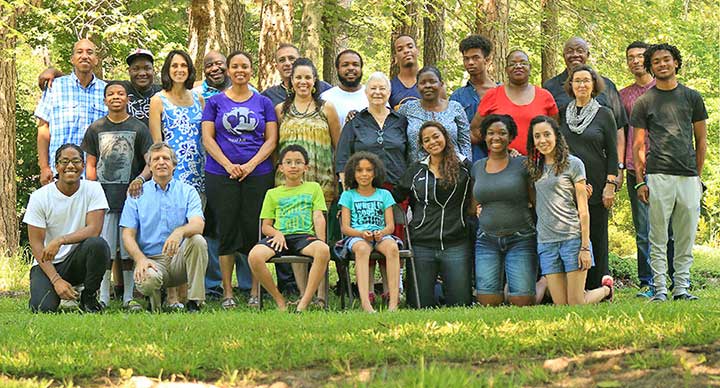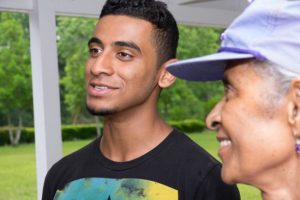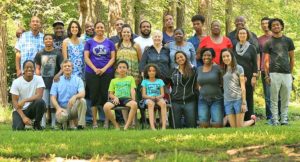



Bridge builder. Capacity builder. These emerge as among the most important roles Dayyan Sisson played while living in and serving a Florence, South Carolina, neighborhood.
He saw young people of color and white adults develop a loving relationship. He witnessed those youths earnestly attain an understanding of new concepts and joyfully share their learning with others.
Sisson, now 20, moved there two years ago from California as part of a Baha’i initiative known as the South Carolina Enterprise.


The project was launched two years earlier, explains Danita Brown, a member of the sponsoring Regional Baha’i Council of the Southeastern States, to learn about “how to reinvigorate neighborhoods” of such populations as American Indians, African Americans and immigrant groups.
This program, Brown says, brings in young people — especially African Americans — who have experience in sharing Baha’i-inspired activities, such as junior youth groups and children’s classes, that foster personal and societal transformation. Those young people settle as homefront pioneers in several communities surrounding the Louis G. Gregory Baha’i Institute in the state’s northeast.
During his time in the South Carolina Enterprise, Sisson talked with many young people ages 15 and up about mentoring those younger than themselves. As he got to know these local youths, he would invite them into a program of training and service known as the institute process.
The interaction between races
Florence is a largely segregated community. Within their own neighborhoods, many youths often find little interaction with other races outside of what they see in the media.
This often presented a cultural challenge as the enthusiastic Baha’is of Florence (many of whom are white) entered neighborhoods (predominantly black) to invite people to participate in the institute process.
On several occasions in north Florence neighborhoods, outreach in the parks and on door-to-door campaigns was received with markedly less enthusiasm when the youth volunteers were accompanied by white adults.
With wisdom and tact, the pioneers in the communities persevered in bringing members of other races into north Florence for outreach, as well as for prayer gatherings and other Baha’i activities. And as the community members began to see the Baha’is’ purity of motive, they began to relax.


Parallel to this process was introducing the youths in the institute process to spaces with Baha’is of all races outside of their own neighborhood. On one such occasion, a group of black youths from west and north Florence were brought to a devotional gathering in a predominantly white suburban neighborhood.
Many of the youths had taken Book 1, Reflections on the Life of the Spirit, in the Ruhi Institute training sequence and had met Baha’is previously. But I drove a car full of youths who had just recently entered the institute process and had yet to meet other Baha’is. After parking in the neighborhood and leaving the car, I realized that none of the youths from the neighborhood got out. I went back and asked them why.
They cited many reasons, spanning from superstition (a rumor that white people’s homes are haunted) to general discomfort, and it took some persuasion to eventually convince them to set aside their preconceptions and come inside.
Even then, the youths were always on guard. They were in an uncomfortable situation — black youths in a white person’s nice home in a suburban white neighborhood. Even the food served and the bright smiling faces of the Baha’is didn’t immediately ease them.
It wasn’t until the youths began praying with the Baha’is that there was a shift in energy. For the youths, seeing people whom society had dictated as so vastly different from them saying the same prayers and worshipping God in the same way began to disarm them.
The transformation was not overnight. It took sustained interaction with the community and loving accompaniment by the youths serving in the neighborhood to nurture a loving relationship. But over several months, these black youths grew closer to their white community members, playing with their children, attending gatherings at their homes, and studying the Word of God together.
Literacy and the Word of God
Language was another challenge to overcome. With literacy in South Carolina below average, especially in the neighborhoods where pioneers settled, the tutors of classes for the study of Ruhi training books had to be attentive and creative about the way youths moved through the institute process.
Understanding and adapting to the local dialect was an important step for tutors. Additionally, some youths began their study with books designed for those a little younger.
Regardless of the strategies, one thing became very clear. Learning was deeply rewarding for the youths. Every time the participants understood a new concept, or learned a new word, they became illumined. Being able to share their learning was another source of joy.
The practice recommended in Reflections on the Life of the Spirit — sharing a prayer with someone — provided those involved with a wellspring of learning and growth. On one occasion, a group of youths studied this prayer:
I beseech Thee, O my God, by all the transcendent glory of Thy Name, to clothe Thy loved ones in the robe of justice and to illumine their beings with the light of trustworthiness. Thou art the One that hath power to do as He pleaseth and Who holdeth within His grasp the reins of all things, visible and invisible. —Baha’u’llah
The youths began by defining words: reviewing simpler words like “trustworthiness” and “robe,” becoming acquainted with older words like “grasp” and “clothe,” and learning more difficult words like “transcendent” and “beseech.” They then began to examine entire concepts, like what it means to “clothe Thy loved ones in the robe of justice” or to “illumine their beings with the light of trustworthiness.”
This wasn’t easy. Only after a lot of discussion did they achieve a basic level of comprehension. The youths, initially enthused but growing weary, were faced with the challenge next of learning to present these concepts to others. We discussed different techniques, tried role playing and tried to understand the prayer further, but after some time the youths became restless and impatient with themselves and the process.
The youths decided instead to formulate three questions they would ask and be content with that level of preparation. I knew it would not prove to be enough, but I felt they had a sufficient understanding of the prayer and enough willingness to share it that all would be well.
A few days later, we arrived at the home of a Baha’i to share the prayer. As we walked up the steps, I noticed their nervousness. I told them that so long as they put their trust in God He would aid them. They smiled in reassurance but otherwise said nothing. I told them I would not speak during the activity other than to introduce them.
After we entered the home and they were introduced to the Baha’i, we all sat together in the living room. I stayed farther back. The youths looked at me with wide eyes. But when I made no motion to assist them, one of the girls began the activity. They read the prayer together twice and began asking their pre-formulated questions.
After an all-too-brief discussion, the youths began talking among themselves, “That was our three questions. What else do we say?” They glanced over at me but I did not respond.
After some silence, the girls turned and began to ask new questions on the spot. Together the group began exploring the prayer more deeply — defining new words, drawing out new meanings, uncovering new concepts, building a common foundation.
They talked about how to apply the prayer to their lives, then began to discuss the implications of this prayer for their families, neighborhood, city and eventually the whole world. I sat in joyful awe of the level of comprehension they were starting to demonstrate.
This continued for some time until finally the group closed with another prayer. They hugged the Baha’i, said parting words and came with me outside. I asked them, “How do you feel?” They paused, and after a moment one responded, “I am so happy and I don’t know why.”
I told them what I had observed: They shared a prayer with a stranger; that took great courage. They uncovered truth in the written Word; that took great patience. They learned with the participant they were sharing it with; that took great humility. They read the reality of the soul they were teaching and responded accordingly; that took spiritual perception. They applied the meaning they found to their own lives and discussed its implications; that took great understanding. By the end they were beaming in joy.
I was in complete adoration and awe of these youths. Here they were, three young high schoolers in a state with one of the lowest literacy rates in the country, discussing the application and implications of literature on a university level. Their learning was not a product of the changes and chances of the world, but a matter of purity of heart and spirit of faith.


![]()
![]()
Whether you are exploring the Bahá'í Faith or looking to become an active member, there are various ways you can connect with our community.
Please ensure that all the Required Fields* are completed before submitting.